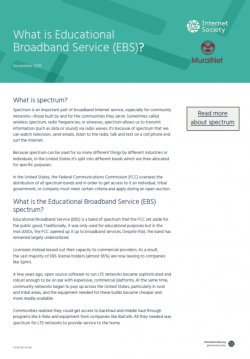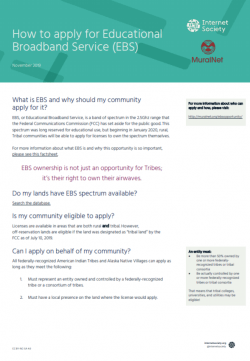What is spectrum?
Spectrum is an important part of broadband Internet service, especially for community networks—those built by and for the communities they serve. Sometimes called wireless spectrum, radio frequencies, or airwaves, spectrum allows us to transmit information (such as data or sound) via radio waves. It’s because of spectrum that we can watch television, send emails, listen to the radio, talk and text on a cell phone and surf the Internet.
Because spectrum can be used for so many different things by different industries or individuals, in the United States it’s split into different bands which are then allocated for specific purposes.
In the United States, the Federal Communications Commission (FCC) oversees the distribution of all spectrum bands and in order to get access to it an individual, tribal government, or company must meet certain criteria and apply during an open auction.
What is the Educational Broadband Service (EBS) spectrum?
Educational Broadband Service (EBS) is a band of spectrum that the FCC set aside for the public good. Traditionally, it was only used for educational purposes but in the mid-2000s, the FCC opened up it up to broadband services. Despite that, the band has remained largely underutilized.
Licensees instead leased out their capacity to commercial providers. As a result, the vast majority of EBS license holders (almost 95%) are now leasing to companies like Sprint.
A few years ago, open source software to run LTE networks became sophisticated and robust enough to be on par with expensive, commercial platforms. At the same time, community networks began to pop up across the United States, particularly in rural and tribal areas, and the equipment needed for these builds became cheaper and more readily available.
Communities realized they could get access to backhaul and middle haul through programs like E-Rate and equipment from companies like BaiCells. All they needed was spectrum for LTE networks to provide service to the home.
Why is EBS special?
Spectrum in this band has the most potential for rural, tribal communities because of the policies that govern it. It is particularly important in the context of next-generation technologies.
National service providers have argued that they need as much unfettered access to the airwaves as possible in order to pave the way for 5G and other technological advances. The FCC even listed this as a primary reason for holding spectrum auctions now.
Just as land was critical to the development of railroads in the 1800-1900s, access to the airwaves today is critical to deploying next generation Internet technology.
What’s happening now?
The FCC recently announced an auction to re-allocate EBS spectrum along and issue new licenses. It also changed the requirements for licensees and dropped rules requiring educational use for this spectrum.
Importantly, the FCC also created a Tribal Priority Window that will allow Tribal Nations to receive licenses for unassigned EBS spectrum on their lands. The window is short – likely only 90 days, beginning January, 2020. When it closes, the auction will be open to all potential licensees.
Now, over 500 tribal governments have an opportunity to apply for EBS spectrum. You can find out if your community is one of them and find more details on who can apply, and how.

